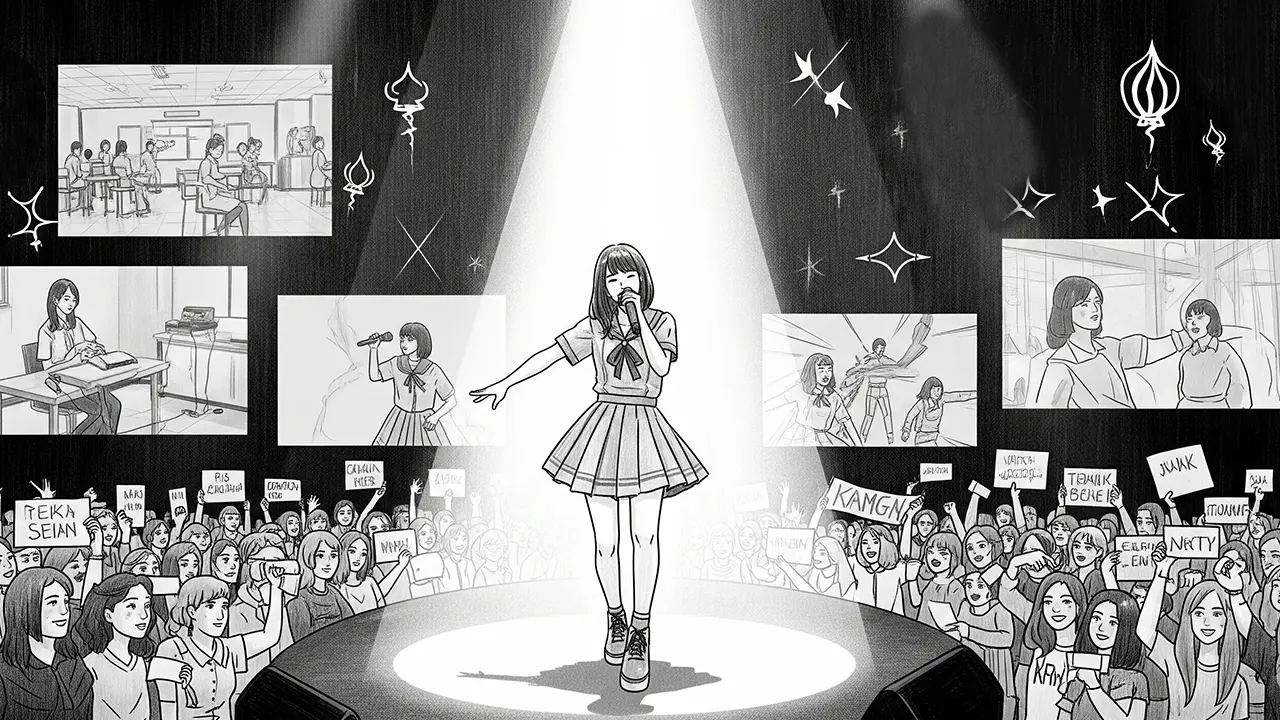In recent years, Indonesia’s entertainment industry has witnessed remarkable growth and transformation. Shaped by rapid technological advancement, shifts in public behavior, and the increasing influx of global cultural influences, the nation’s entertainment landscape has become more vibrant and competitive than ever before.
Amid these dynamic changes, JKT48 has emerged as a cultural phenomenon that continues to captivate the Indonesian public, especially the youth.
Founded in 2011 as the official sister group of Japan’s renowned AKB48, JKT48 introduced a fresh and unique concept to the local entertainment scene. With the slogan “idols you can meet,” the group redefined the traditional artist-fan relationship by promoting closeness, interaction, and accessibility.
Through regular theater performances, active engagement on social media, and face-to-face events such as handshake meetings and concerts, JKT48 offers an entertainment experience that is more personal and emotionally resonant.
However, JKT48 is not merely about singing and dancing. It represents a model of hard work, perseverance, and the value of starting from humble beginnings. Most members begin their journey at a young age, with minimal public exposure, and slowly build their path through intensive training, public scrutiny, and personal growth.
This process, visible to their fans, turns JKT48 into more than just an idol group they become role models who inspire confidence, ambition, and moral development in Indonesia’s younger generation.
At its core, JKT48 embodies the philosophy of idol culture where growth, effort, and closeness to fans are essential values. The group’s appeal lies not only in their polished performances but in the sincerity of their struggles, their willingness to grow publicly, and the emotional connections they build over time.
Through regular theater shows, variety program appearances, and unique events such as the Senbatsu elections, JKT48 has built a loyal and active fan base that reflects the strength of their concept.
Beyond entertainment, JKT48 has become a bridge between Japanese and Indonesian culture. While they adapt AKB48 songs into Indonesian and contextualize their performances to local values, the group also infuses elements of national culture in their stage presence. This two-way exchange not only broadens fans’ cultural awareness but also reinforces national pride within a globalized framework.
What sets JKT48 apart from other idol groups is their active engagement in social causes. They participate in charitable activities, promote education, and support tourism campaigns in collaboration with public and private sectors. This dedication to social contribution solidifies their identity not just as entertainers, but as agents of positive change in modern Indonesia.
From an Islamic perspective, entertainment is permitted as long as it aligns with moral conduct and does not deviate from the principles of Shari’a. Entertainment becomes problematic when it leads to neglecting religious obligations or encourages unethical behavior.
In a well-known hadith, the Prophet Muhammad صلى الله عليه وسلم said, “Every religion has its distinct characteristic, and the characteristic of Islam is modesty.” (HR Ibn Majah). Thus, groups like JKT48 can still contribute to both worldly and spiritual well-being, provided they maintain sincerity, ethical behavior, and a positive purpose.
JKT48’s Role in Shaping National Entertainment
JKT48’s contribution to Indonesia’s entertainment landscape is multifaceted. Firstly, they bring a refreshing approach by fostering deeper artist-fan relationships. Their live theater system, where fans can watch them perform regularly and closely, breaks the usual barrier between celebrities and the public.
This approach encourages genuine human connection within a structured and respectful environment. In a way, this fosters a form of communal harmony, echoing Islamic values of mutual respect and solidarity.
Secondly, JKT48 serves as an inspiration for the younger generation. Fans witness the journey of ordinary young women transforming into confident, talented performers. This transformation teaches values such as resilience, patience, and determination traits highly emphasized in Islam.
The Quran consistently praises those who strive with patience and trust in Allah’s plan, reinforcing the idea that personal growth is a continuous effort.
Thirdly, the fanbase that JKT48 has cultivated is not just about idolizing stars. It has grown into a positive and supportive community that organizes social gatherings, shares information, and conducts charitable activities.
This demonstrates how the entertainment industry, when managed ethically, can become a platform for spreading goodness. As stated in Surah Al-Hujurat verse 13, Allah created humankind into different groups so they might know and benefit each other.
Moreover, JKT48 provides a stage for talent development among Indonesian youth, particularly women. Members are trained not only in singing and dancing, but also in public speaking, media interaction, and community involvement.
Many alumni have gone on to build successful careers in acting, hosting, and entrepreneurship. In Islam, nurturing one’s potential is a moral obligation—as long as it is directed toward beneficial purposes and accompanied by integrity and good character.
The group also contributes to shaping youth culture in a more disciplined and goal-oriented direction. Idol culture, particularly its Japanese model, emphasizes commitment, teamwork, and humility. These values, embedded in the JKT48 system, resonate with the aspirations of young people trying to find their place in a fast-paced world. For Muslim audiences, these attributes reinforce the idea that success must be pursued with sincerity and in accordance with divine guidance.
Despite its many contributions, JKT48 also faces several challenges. One of the most pressing is the mental pressure placed on its members. Being in the public eye demands constant perfection, which can affect mental well-being. Islam emphasizes the protection of the soul (ḥifẓ al-nafs) as one of the five essential objectives (maqāṣid al-sharī‘ah). Therefore, management must prioritize mental health support and foster an internal environment that allows members to flourish emotionally and spiritually.
Another issue is excessive fanaticism among certain fans. While admiration is natural, crossing boundaries into invasion of privacy or obsessive behavior contradicts both social ethics and Islamic teachings.
The Prophet Muhammad صلى الله عليه وسلم warned against exaggeration in praise, saying, “Do not exaggerate in praising me as the Christians exaggerated in praising ‘Isa ibn Maryam.” (HR Bukhari). Moderation must be upheld in all relationships, even between fans and their idols.
There is also the problem of public misconceptions about idol culture. Some segments of society may misunderstand or judge it harshly due to unfamiliarity with the system. To address this, media literacy, cultural dialogue, and inclusive discussions are needed to bridge these gaps and foster a more nuanced appreciation of modern entertainment phenomena like JKT48.
A Symbol of Balanced Entertainment
As an observer of the industry and an admirer of positive entertainment, I believe JKT48 has significantly shaped the evolving identity of Indonesian pop culture. Their model, based on hard work, sincerity, and interaction, serves as a beacon of what entertainment can achieve when rooted in ethical values.
In a predominantly Muslim country like Indonesia, it is crucial to maintain a balance between cultural consumption and religious beliefs. Islam does not forbid entertainment, but rather guides it toward what is beneficial, spiritually uplifting, and morally sound.
As stated in Surah Al-Baqarah verse 143, Allah has made the Muslim ummah a “middle nation” (ummatan wasaṭan)—one that upholds balance in all aspects of life, including leisure and amusement.
JKT48 embodies this principle by offering a form of entertainment that entertains without violating ethical boundaries. Their work fosters character, cultivates community, and opens doors for personal development.
With continued support from management, fans, and society at large, JKT48 has the potential to remain a powerful influence in shaping a wholesome, modern, and morally grounded entertainment culture in Indonesia.
They have proven that music, performance, and pop culture can inspire not just entertain. And in doing so, they invite us all to see entertainment not merely as a pastime, but as a meaningful vehicle for growth, unity, and hope.








